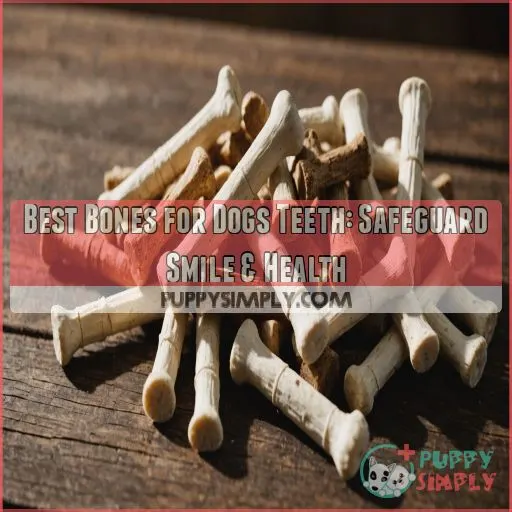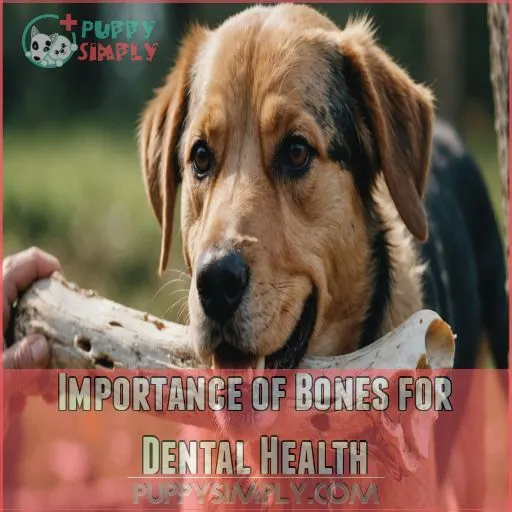This site is supported by our readers. We may earn a commission, at no cost to you, if you purchase through links.

Remember, size matters—avoid those massive beef bones that could leave you with a hefty dental bill.
Did you know dogs can enjoy the benefits of medium-sized bones without the risk of breaking a tooth for safe bone options?? Plus, they’ve got the added perk of being softer, making chewing a fun puzzle rather than a dangerous adventure.
Curious about alternatives or specific recommendations? Stick around for more juicy insights!
Table Of Contents
- Key Takeaways
- Importance of Bones for Dental Health
- Recognizing Dangers of the Wrong Bones
- Safer Bones and Choices
- Feed With Restraint – Wrong Bone Real-World Ramifications
- Frequently Asked Questions (FAQs)
- What are the safest bones for dogs teeth?
- What bones can I use to clean my dog’s teeth?
- What bones are good for dogs with cracked teeth?
- Do bones help with dogs’ teeth?
- What are the best bones for aggressive chewers?
- How does bone hardness impact dental health?
- Are synthetic bones a safe alternative?
- What are signs of a bone causing harm?
- How often should dogs chew on bones?
- Conclusion
Key Takeaways
- Opt for Raw Lamb or Goat Bones: These medium-sized bones are nature’s toothbrush for your dog—scrubbing away plaque and keeping teeth gleaming without the risk of cracks. Think of them as the gentle alternative to hard beef bones that could send you running for a dental budget!
- Avoid Oversized and Cooked Bones: Giant beef or bison bones are like asking your dog to wrestle a heavyweight champion—it’s risky and could end in tears or fractured teeth. Cooked bones? They’re more like playing with fire—brittle and prone to splintering, not to mention the choking hazards.
- Consider Synthetic Alternatives for Safety: If you’re nervous about nature’s options, synthetic bones offer a reliable suit of armor for your pup’s teeth. They’re safer against splinters and infections while still giving those gnashers some good exercise.
- Stick to a Bone Chewing Routine: Just like us humans need a routine, your dog’s dental health thrives on regularity, and feeding pig trotters can be a part of that. Aim to offer raw bones around 1-2 times a week. Imagine them as weekly dental dates for Fido to maintain that award-winning smile!
Importance of Bones for Dental Health
For your dog’s dental health, bones aren’t just a treat; they’re nature’s toothbrush.
Offering raw bones keeps teeth sparkling clean and also turns your pup into a happy, tail-wagging dental assistant.
How Raw Bones Keep Teeth Clean and Shiny
With a knack for power cleaning teeth, raw bone chewing is the canine equivalent of brushing and flossing combined, but without the minty aftertaste.
When your dog joyfully gnaws on raw bones, it creates an abrasive action that naturally scrubs away plaque, helps keep tartar prevention in check, and even polishes enamel like a pro.
These chew bones are nature’s dental heroes, promoting unbeatable dental health without a hitch. Forget about pricey dental cleanings; these natural techniques offer protection but also potentially prevent dental disasters. Give your pup control over their smile with nature’s tailor-made dental chews!
Types of Bones Ideal for Safe Dental Cleaning
Lamb and goat bones are ideal for safely cleaning your pup’s pearly whites. These medium-sized raw bones act as a natural abrasive, gently scrubbing away plaque and tartar. Unlike hard beef or bison bones, they won’t crack your dog’s teeth. Plus, their softer texture makes them easy to chew and digest.
Toss one of these bones their way 1-2 times a week for a gleaming smile.
If you’d rather skip the mess, try dental chews with the vohc seal or frozen, bone broth-soaked carrots.
Either way, keeping those chompers clean is key to preventing painful periodontal disease. Your dog will thank you with lots of sloppy kisses!
Recognizing Dangers of the Wrong Bones
Choosing the right bones for your dog is really important to avoid painful and costly broken teeth.
Let’s explore how to prevent these dental disasters with a focus on safer bone options for your furry friend.
Fractured Tooth Risks and Treatments
When it comes to dog dental health, giving the best bones for dogs’ teeth is a balancing act. Mistakes can lead to fractured tooth risks, which can be as unwelcome as a cat in a dog park!
Here’s how you handle a tooth mishap:
- Identify fractured tooth symptoms: Watch for pain, swelling, or running from the bone like it’s haunted.
- Consider tooth repair methods: A Cinderella-fairy cement cap might save the day if you act fast.
- Factor in dental costs: Broken teeth can cost you more than your last vacation.
- Seek a veterinary dentist consultation: They’ll guide you like a GPS in a corn maze!
Bone-Specific Symptoms of Fractures in Dogs
Spotting bone-specific symptoms of fractures in dogs can be a real detective game. You’ll notice changes in your dog’s chewing behavior and maybe even some odd pain indicators.
If Fido’s avoiding his favorite raw meaty bones or yak milk chew bones, it’s a clue.
Watch for signs like swelling or bleeding around the mouth—red flags waving! Ignore these at your peril; untreated fractures can lead to internal injuries. Veterinary care at this point isn’t just a pet project, it’s a must.
Offer safe dog bones like lamb or goat and swap in synthetic dental bones to protect those pearly whites like raw beef bones!
Safer Bones and Choices
Choosing the right bones can make all the difference in your dog’s dental health.
Raw, medium-sized animal bones are the safest bet, providing effective cleaning without the risks of tooth fractures or digestive issues.
Go for Small-Medium Sized Raw Animal Bones
Think of dog chewing habits like a culinary adventure—except it’s a quest for dental health!
Opt for small to medium-sized raw bones: they’re dog-size bites of oral hygiene goodness.
Here’s why:
- Bone Safety: Medium bones reduce fracture risks.
- Bone Types: Choose lamb or goat for marrow magic.
- Raw Bone Benefits: Naturally scrapes away plaque like raw, uncooked bones.
A cooked bone? That’s like giving a fork to a spoon-loving pup!
Dental and Physical Effects of Oversized Hard Bones
Oversized hard bones can be a real pain in the neck—or rather, the mouth—for your furry friend.
With bone fracture risks lurking, these hefty gnashers might cause tooth damage and even jaw strain.
Picture your pooch struggling like a strongman in a tug-of-war, not ideal, right?
Besides, it can lead to issues with gum health and digestive issues.
Opt for bones that provide the perfect teeth treats!
Frequency for Effective Cleaning, Feedings Should
For the best dental health, don’t go barking up the wrong tree! To get the best results for your dog’s teeth, follow a safe feeding schedule. Here’s a recommended bone feeding schedule:
- Feed raw bones 1-2 times per week to avoid dangerous bone splinters.
- Adjust based on your dog’s size and breed.
- Monitor your dog’s dental health regularly.
- Choose bones from medium-sized animals for best results in canine nutrition and care.
Your dog’s smile will be shining in no time!
Feed With Restraint – Wrong Bone Real-World Ramifications
Feeding your pup the wrong bones can lead to costly dental repairs, painful injuries, and even life-threatening choking hazards. It’s important to exercise restraint and choose the right size and type of bones. Oversized, hard bones like beef or bison can crack teeth, while cooked bones become brittle and pose a serious choking risk. Instead, opt for medium-sized raw bones from lamb or goat – they’re softer, safer, and will keep your dog’s smile sparkling. Remember, you’re responsible for your pup’s wellbeing, so be selective with their treats.
| Bone Type | Potential Risks | Safer Alternatives |
|---|---|---|
| Beef/Bison | Tooth fractures | Lamb/Goat bones |
| Cooked Bones | Choking hazard | Raw, medium-sized bones |
| Chicken Bones | Splintering risk | Dental chews, carrots |
Safer Bones and Choices
Frequently Asked Questions (FAQs)
What are the safest bones for dogs teeth?
Opt for raw, medium-sized bones like lamb or goat – they’re gentle on your pup’s teeth and help scrape away plaque.
Steer clear of cooked, brittle bones that could crack their pearly whites.
Your dog’s dental health will thank you!
What bones can I use to clean my dog’s teeth?
Give your dog’s chompers a workout with raw lamb or goat bones for safe bone choices.
These medium-sized options are like nature’s toothbrush, scrubbing away plaque safely.
Steer clear of beef or buffalo bones—they’re tough and can crack teeth!
What bones are good for dogs with cracked teeth?
Considering cracked teeth, steer clear of hard bones like beef or bison.
Try softer, raw lamb or goat bones for dental hygiene, as they’re gentler on sensitive teeth and a real treat.
Regular check-ups help keep Fido comfortable!
Do bones help with dogs’ teeth?
Chewing on the right bones helps keep dogs’ teeth clean by scraping away plaque, like nature’s toothbrush.
Choose raw lamb or goat bones for effective dental cleaning, ensuring safety by avoiding hard or cooked bones (Source).
What are the best bones for aggressive chewers?
For aggressive chewers, you’ll want to go for tough, durable bones like beef or bison.
Just steer clear of cooked varieties, which can splinter and pose a serious choking hazard.
Chew on that!
How does bone hardness impact dental health?
Bone hardness is important! It can be a tooth’s worst enemy or best friend.
Hard bones—like beef—can crack teeth.
Softer raw bones gently clean teeth, preventing costly repairs.
Always consult your vet for personalized advice (Source).
Are synthetic bones a safe alternative?
Just like a knight’s armor, synthetic bones protect and entertain.
They’re safer than natural bones, reducing risks from sharp splinters and bacterial infections, while still offering dental health benefits with supervision and the right choice of material (Source).
What are signs of a bone causing harm?
You notice your dog’s discomfort if they’re chewing an unsafe bone: watch for drooling, bleeding gums, difficulty eating, or swelling.
Be proactive, and don’t wait for the situation to turn into a "bone of contention.
How often should dogs chew on bones?
A dog’s dental health is no walk in the park, but the right bones can be a game-changer.
Aim for raw, medium-sized bones 1-2 times a week – your pup’s pearly whites will thank you!
Conclusion
Choosing the best bones for dogs’ teeth means a happy pup, a healthy smile, and a wagging tail.
It’s all about selecting the right size—medium bones work wonders without risks.
Raw lamb or goat bones scrub plaque effectively, keeping your dog’s teeth gleaming.
Avoid oversized ones to prevent tooth fractures and expensive dental visits.
So, keep it smart, safe, and simple for that radiant grin!










